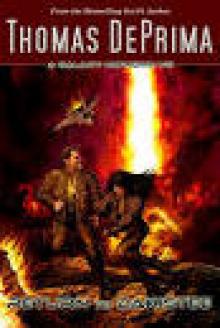- Home
- Thomas DePrima
A Galaxy Unknown Page 2
A Galaxy Unknown Read online
Page 2
* * *
After three long months of interminable waiting for rescue, Ensign Jenetta Carver was ready to climb the walls! She'd managed to maintain her sanity this long by spending innumerable hours listening to the music selections available on the pod's computer as she partook of the reading material bounty also contained in its memory. Owing to their acutely insipid nature, she'd only been able to suffer through the plethora of administrative and technical manuals once, but she'd read the few fictional novels several times.
Most of her immurement had been spent studying the dozens of available military tomes. The three-volume master-piece On War, by Karl von Clausewitz, the Prussian general and military theorist who proposed a doctrine of total war, and war as an extension of diplomacy, was definitely the most thought provoking. Numerous books written about historical battles, one covering warfare back to the First Punic War in 264 BC, had also been loaded into the computer. As a personal exercise she modified a battle simulation program she found in the system so that she could change certain strategic variables. She fought historic wars over and over, with different troop strengths, reinforcements, weapons, supplies, terrain, and weather conditions to see how the outcome was affected. She was amazed by how many of history's most famous battles could so easily have gone the other way if the defeated commander had possessed marginally better intelligence information with regard to the enemy's position, strength, or movement, better communication with unit commanders, better timing, or perhaps— just a little better luck. The most successful commanders, such as Alexander the Great, had been those that came to rely on surprising the enemy by always doing the unexpected.
She also whiled away the hours by exercising to stay in shape, or by playing the only game contained on the personal log ring she always wore. Written by an unknown programmer, her game was one of several that she'd found in an ancient archive of Internet software programs, while still in elementary school. Dating back to the days before Earth made contact with any extraterrestrial species, it assumed all aliens to be vicious and voracious, blood-sucking, flesh-devouring monsters, who must be destroyed on sight. Her advanced computer skills had enabled her to adapt it to modern computer systems and it gave her something to occupy her time and mind whenever she found herself in boring situations.
Jenetta had shared the game, which progressed through four levels of play for the skillful participant, with her computer geek friends at school, but few ever made it beyond level two. The hand-eye coordination required to master it, and repel the waves of alien fighter ships, missiles, mines, and torpedoes, was extreme, and as a result of uncounted hours spent playing the game, Jenetta's skill was unparalleled. Over the past several months, she'd launched the alien-attack action game whenever she felt a bout of depression coming on. Currently, she was turning to the game for comfort at least a dozen times each day.
* * *
Indisputably pertinacious, Jenetta nevertheless knew that when you arrive at a point where all hope of rescue has evaporated, it makes little sense to continue on as if you genuinely expect someone to arrive. Her intelligence had always prevented her from sinking into mires of self-delusion, and that strength didn't desert her now. At two-hundred-fifty-seven million kilometers from the Hokyuu's explosion, she was well outside the area that rescue ships would scour in their search for survivors. If they had picked up her emergency beacon signal, they would have already arrived. Since the craft wasn't under power, there was no energy signature to trigger a rescue ship's sensors. Well clear of the normal shipping lanes in this sector of space, it could conceivably be years before her pod crossed paths with a vessel. With near term rescue unlikely in the extreme, Jenetta decided to use the only real option left open to her, stasis.
Having made the difficult decision to sleep away the rest of her journey, and her life if rescue never came, Jenetta prepared herself for a long hibernation. She'd been recording a daily log message, but basically being just estimated position reports, they all sounded essentially the same. She knew this one would be very different as she sat down at the pod's console.
With azure eyes that reminded one of the deep blue, some-times purplish color of Earth's oceans, Jenetta stared dispassionately into the tiny lens of the camera. Sitting ramrod straight, she began her final report in a calm and professional voice.
"Computer, entry to official log of Ensign Jenetta Alicia Carver, GSC serial number 3974A32, Earth date January 1st, 2257. Begin recording. It's now been ninety-three days since the explosion of the Hokyuu. As this life pod has continued to move steadily away from the disaster location, it's become abundantly clear that Space Command rescue vessels are not going to find me. I've decided to use one of the onboard stasis chambers, so this will be my final log entry. It has been an honor and a privilege to serve as a Space Command officer. Computer, end message."
Briefly touching the personal log ring that she always wore on the small finger of her left hand to the computer's interface spindle, she said, "Personal log entry. Space Command still hasn't found me, nor do I really expect them to still be looking. I'm on my own, without benefit of spacecraft mobility or communications. The isolation is getting to me. I can't take being alone any longer. Rather than waiting until my sanity is gone, or the food supply exhausted, I'm going to take a chance on one of the stasis beds." Glancing towards the chambers pensively, she breathed deeply and released it before saying, almost as an aside, "I hope the bed performs up to specs." Returning her gaze to the camera lens, she continued with, "The odds of being found while I'm still alive are probably about a million to one, so I've been thinking for days about what I'll say in a farewell message to my family. There's no easy way to say goodbye so I'll just keep the message short and to the point. End of entry. Log message."
She deftly keyed in her password and touched the ring to the spindle again to record the entry, then tried to prepare her-self mentally for the next task, recording a personal vidMail message to her parents and siblings. A lump began to materialize in her throat as she looked at the framed picture she'd been able to grab from her dresser before leaving the Hokyuu, and she fought back the tears that strained to break free. Composing her attractive face, she did her best to look apathetic about the almost certain fate that confronted her. She hoped that she could complete the message before her dam of pent-up emotions broke.
"Computer, personal message to Captain Quinton E. Carver, Galactic Space Command. Begin recording. Hi Dad. Hi Mom. Hi Billy, Richie, Andy and Jimmy, if you're there. If you're seeing this, then I didn't make it. It's New Year's Day, 2257. I hope you all had a wonderful Christmas. A problem with the escape pod retrorocket failed to keep me near the ship's explosion site, so rescue has become— improbable. I'm about to use one of the on-board stasis chambers because I don't know how long it will take Space Command to find me. I still have more than four months of emergency rations left, but it doesn't make sense to stay awake any longer, so I'll just sleep until I'm found. I don't regret my decision to join Space Command and, while I'd hoped for a longer tenure, I'm proud to have served the Galactic Alliance. I want you to know how much I love all you guys, and I––" Jenetta had to pause for a second to swallow the lump in her throat before it prevented her from talking. "––can't wait to be with you again, whether it's here, or— in heaven. Goodbye." She smiled sadly and touched the forefinger and middle finger of her right hand to her lips to kiss them, then pressed them to the video lens before saying, "Computer, end message."
"Damn," she said with difficulty as she again tried to swallow the lump in her throat. With a trembling hand, she wiped at the tears that had begun to trickle down her face halfway through the message. "I didn't want them to see me cry." She sniffed to clear her sinuses and considered re-taping the message, but realized that she wouldn't be able to hold back the tears any better on subsequent recordings. In fact, it might be far worse now that she was caught up in the emotion of the moment. It's not easy to say farewell to people that you love.
After initiating the process that would lower a stasis chamber from its storage position against the starboard wall, Jenetta removed her clothes and reduced the pod's gravity to one-tenth normal. While also reducing the drain on the pod's power cells, the greatly reduced gravity in the pod would place less stress on her body during stasis. As the bed locked down onto the deck, she wiggled into an elasticized, skin-tight stasis suit, taking extra care with the plumbing connections so it'd be as comfortable as possible during her sleep. When the fit was right, she raised the cover of the chamber and climbed into the coffin-like enclosure. After connecting the harness that would keep her sleeping form from shifting around inside the chamber should the gravity fail, she connected the suit's electronic sensors to the bed's monitors, and its plumbing connections to the polyvinyl hoses that disappeared into the bed's base. With the hookups complete, she pressed the system button to test the plumbing seals. This was the part of the process that she dreaded most, and she winced as the suction pulled the suit ever tighter between her legs until the green light winked on, indicating that the seal was complete. Her final preparation was to insert the mouthpiece and seal the large transparent facial mask to the hood of the stasis suit, then activate the respiration process.
The young, GSC ensign sighed, took a sad last look around, lay down with the framed picture of her family clutched tightly to her chest, and pressed the button that would close and seal the chamber's transparent cover before beginning the stasis process. An almost imperceptible hissing sound, as the colorless gas filled the mask, would be the last thing her mind recorded as she slipped into unconsciousness.
* * *
Chapter Two
~ June 18th, 2252 ~
Cadet Jenetta Alicia Carver, youngest of Quinton E. and Annette P. Carver's five progeny, entered the Northern Hemisphere Space Academy on Earth in June of 2252. Born into a large family at a time when most couples only sought to complicate their busy lives with one offspring, her young life had been devoted to following in the footsteps of her father and four older brothers, all of whom had graduated from that venerable institution in Missouri, USNA. Their Nordic ancestry patently obvious despite an anglicized name, each of the Carver children aspired to become an officer in the Galactic Space Command like their often-absent father. William, seven years Jenetta's senior, had been the first of the children to enter the Academy, followed by Richard one year later, then Andrew and James, the twins, two years after that.
In sedulous pursuit of the academic standard established by her older brothers, Jenetta graduated with top honors in her class at the advanced scientific preparatory school where she had enrolled as an alternative to the regular high school that most children on the Space Command base attended. But graduating with top honors doesn't mean quite as much when your older siblings also graduated with top honors. She cared little for her academic standing among fellow students, so focused was she upon earning even a small degree of respect and admiration from her brothers. But being the youngest and smallest of five, in a household overflowing with testosterone pumped energy, provided little opportunity for sibling plaudits.
Although her scholastic record virtually assured that she would excel at the space academy, her years there were difficult. People who knew her well traced her problems back to one early, embarrassing incident, but it was actually only the capstone on a juvenile life filled at times with feelings of consummate inadequacy at home.
Before entering NHSA, generally pronounced Noss-sah, Jenetta had never even seen an O'Connell Power-Cell Regeneration Unit. But during their first semester, cadets are expected to partially disassemble and rebuild one, without help, while encased in an extravehicular activities suit. More commonly referred to as E.V.A. suits, the cumbersome garments allow people to work and function in a zero gravity, zero atmosphere environment. The O'Connell Power-Cell Regeneration Unit is an integral and critically important part of every spaceship, large and small, and every officer in Space Command must be able to repair one in the event of its failure. A worst-case scenario would have the unit located in a part of the ship that has lost both atmosphere and gravity.
Situated around a single, third-floor classroom, each of the Academy's four, three-story high zero gravity labs share a common window with that room, permitting students to watch their fellows perform the lab exercise. After each four students have completed an exercise, and their work has been graded, technicians move in to reset the power units to their former non-functioning condition.
Jenetta was among the final group of four on the day of her test. She had waited nervously all afternoon for her turn to come, as one by one the other students suited up and entered one of the four lab chambers. Having studied the OPCR manual intensely for the past month, Jenetta had committed every component of the unit to memory, much as a medical student memorizes the bones of the human body.
When her turn finally arrived, lab assistants helped her into a bulky space suit and then shoved her through the door of the lab. Although the OPCR was visible from the classroom's observation window, coming face to face with it from ground level, was a bit overwhelming. The ten-meter high device loomed ominously above her as she stood looking up at the behemoth from less than a meter away. Her task seemed suddenly more daunting. When the gravity in the lab was excised, Jenetta announced diffidently that she was ready to begin the exercise. Using the suit's maneuvering jets, she nervously jockeyed into position near the top of the large piece of equipment and attached a tether strap from a self-retracting coil attached to her maintenance harness. Special tools on her belt allowed her to begin removing the covers from the unit's control panel. Twice losing her grip on a tool, and then having to un-tether and chase it clumsily around the lab until she caught it, she could see her classmates laughing at her predicament from the third floor classroom.
When at last the control unit was laid open for maintenance access, Jenetta attached the test monitor and proceeded to replace the ruined circuit rods as quickly as possible from the replacement kit strapped to her right leg. She had completed the repairs and was about to close the covers when the five-minute warning timer sounded. In an effort bordering on desperation to finish in time, she began furiously bolting the covers into place! With time almost exhausted, she reconnect-ed the power cables and shoved off from the unit. Zipping down to ground level, she was just in time to depress the button on the wall that would stop the clock before time expired! Only two seconds remained after she stabbed the button.
As gravity was restored and she sank heavily to the floor, Jenetta breathed a grateful sigh of relief that she had managed to complete the exercise without incurring a time penalty. The same lab assistants who'd helped her don the clumsy suit, assisted in its removal once she exited the lab. Being the last of the class to complete the task, she was hurried along to the classroom where Professor Hubera waited impatiently to grade the last four lab exercises of the day. Now in his mid-sixties, Hubera had long ago misplaced his sense of humor, if he ever had one, and a permanent scowl defined the pallid face beneath a thick mat of silver-white hair. He preferred to be called Professor, rather than by his official Space Command rank of Captain.
Moving as a group to each window overlooking a lab, the class watched intently as Hubera remotely applied power to the device that had just been serviced, while monitoring its output. During the afternoon, a couple of the units had failed to function, and a couple produced only partial power, but no one was prepared for what happened when power was applied to the unit that Jenetta had serviced.
As Hubera flipped the power switch, a geyser of sparks spewed from the top of the OPCR! He fumbled anxiously with the control remote and managed to turn off the power, but the unit continued to smolder, filling its lab with a dense cloud of acrid smoke that obscured the view completely. As the class erupted in laughter, Professor Hubera glared silently at Jenetta, his jaw clenched in anger. She turned a bright crimson and prayed for a hole to open up and swallow her whole as he first lam
basted her for confusing the color-coded power cables during the re-assembly step, and then proceeded to lecture her strongly and loudly at length, in front of her classmates, on the merits of proper disassembly and reassembly. She naturally received a failing grade for the lab exercise, despite the fact that she had replaced all of the component rods correctly.
For the rest of her years at the Academy, her classmates joked about the day she smoked the lab. Fortunately, she led the entire freshman class in math and science course work, so the incident in the lab didn't result in her dismissal from the Academy. But the embarrassment followed her like an expanding spectre from year to year and she always found herself vacillating during lab exercises, especially during command and control battle simulations in her junior year. So fearful of making a serious mistake that would again make her a laughing stock, she deliberated much too long in every engagement. She either lost her ship within minutes of the danger scenario commencing while acting as captain, or contributed significantly towards its loss by her apparent indecision when she occupied some other chair on the bridge. The effects of each loss became cumulative and her performance as a bridge officer declined with each new exercise.
* * *
Although all cadets are required to carry the same basic course load during their first year, it changes considerably thereafter. Cadets desirous of careers in medicine, engineering, economics, legal, intelligence, or political science are channeled into a heavy concentration of applicable course work. Depending upon the requirements of each field of specialization, they might continue their study at various universities, labs, or hospitals after graduation from the academy. They do not receive their posting until they've completed their studies.
The remaining cadets follow a regimented curriculum of math, science, astronautics, and flight training as they vie for the limited slots that could eventually lead to warship command. At the conclusion of a cadet's third year in the command program, an Evaluation Panel of Space Command officers and instructors make the final career assignments. Cadets not deemed suitable for ship command at that time are redirected into programs of intensive study designed to prepare them for their adjudged apposite postings.

 Milor!
Milor! New Title 1
New Title 1 Return to Dakistee (A Galaxy Unknown, Book 8)
Return to Dakistee (A Galaxy Unknown, Book 8) The Invasion Begins
The Invasion Begins When the Spirit Calls (When the Spirit... series - Book 2)
When the Spirit Calls (When the Spirit... series - Book 2) Changing of the Guard (A Galaxy Unknown - Book 11)
Changing of the Guard (A Galaxy Unknown - Book 11) When The Spirit Moves You
When The Spirit Moves You Castle Vroman
Castle Vroman Clidepp Deja Vu
Clidepp Deja Vu Vengeance Is Personal (A Colton James Novel, Book 2)
Vengeance Is Personal (A Colton James Novel, Book 2) Retreat and Adapt
Retreat and Adapt Return to Dakistee
Return to Dakistee A Galaxy Unknown
A Galaxy Unknown